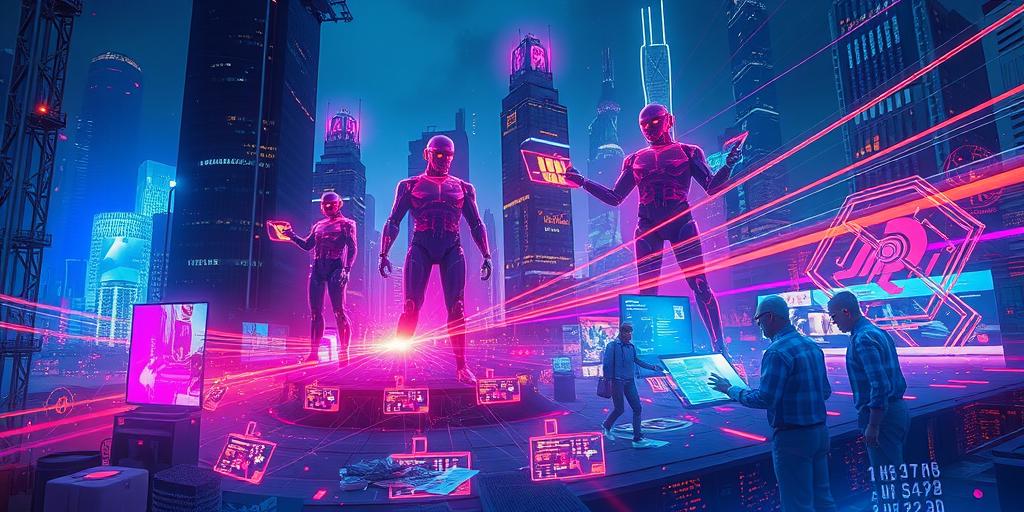The world is on the cusp of a creative revolution, driven by the rapid advancements in AI creativity. AI is no longer just a tool for automation; it’s becoming a collaborator, a catalyst, and a source of inspiration for artists, designers, musicians, and creators across various industries. We’re witnessing a shift in how we think about creativity, where AI is not replacing human ingenuity but rather enhancing it, opening up new avenues for artistic expression and innovation.
The Rise of AI-Powered Creativity
AI as a Collaborative Partner
Think of AI as a creative partner, a tool that can help you overcome creative blocks, explore new ideas, and push the boundaries of your imagination. AI-powered tools can analyze vast amounts of data, identify patterns, and generate unique concepts, providing you with a springboard for your own creative process. Imagine collaborating with an AI that can understand your artistic vision and suggest variations, color palettes, or compositions you might not have thought of.
Breaking Creative Barriers
AI is breaking down traditional creative barriers, making it easier for individuals without technical expertise to explore creative pursuits. With AI-powered tools, anyone can create stunning visual art, compose music, or even write engaging stories. This democratization of creativity empowers a wider range of people to express themselves and share their unique perspectives with the world. AI can help you translate your ideas into tangible creative outputs, regardless of your technical skills, opening up a world of possibilities for everyone.
Transforming Industries with AI Creativity
Art and Design
Generative Art
AI is revolutionizing the art world with the emergence of generative art. Algorithms can create unique and complex artworks, exploring abstract concepts, manipulating colors and shapes, and even generating completely new artistic styles. This has led to the creation of breathtaking AI-generated masterpieces that are pushing the boundaries of artistic expression.
Personalized Design
AI is also transforming the field of design, enabling personalized experiences for consumers. From custom-made clothing and furniture to tailored website layouts and user interfaces, AI can leverage data to create products and services that are specifically tailored to individual needs and preferences. This level of personalization enhances user satisfaction and opens up new opportunities for creative businesses.
Music and Entertainment
AI-Composed Music
AI is now composing music, generating melodies, harmonies, and rhythms that are often indistinguishable from human-composed music. While some argue that AI-composed music lacks soul, others believe that it expands the musical landscape and offers new possibilities for artistic expression. The future of music is likely to see a blend of human and AI-generated compositions, creating a richer and more diverse musical experience.
Interactive Storytelling
AI is also making its mark in the world of storytelling. Interactive narratives powered by AI can adapt to user choices, creating unique and personalized stories that unfold in real-time. This opens up new avenues for immersive storytelling experiences, where the audience becomes an active participant in the narrative.
Marketing and Advertising
Targeted Content Creation
AI is revolutionizing marketing and advertising by enabling personalized content creation. By analyzing customer data, AI can generate targeted ads, social media posts, and marketing materials that resonate with specific audiences. This personalized approach can significantly improve campaign effectiveness and engagement.
Personalized Experiences
AI can also create personalized experiences that enhance customer engagement. From chatbots that provide instant customer support to personalized product recommendations, AI is transforming the way brands interact with their customers. This creates a more engaging and tailored customer journey, leading to increased satisfaction and loyalty.
The Ethical Considerations of AI Creativity
Copyright and Ownership
The rise of AI creativity raises important questions about copyright and ownership. Who owns the rights to an AI-generated artwork, the AI developer or the user who prompted the AI? This is a complex legal issue that requires further exploration and clarification as AI-generated content becomes more prevalent.
Bias and Discrimination
AI algorithms are trained on vast datasets, which can contain biases and prejudices. This can lead to AI-generated content that reflects or even amplifies existing societal inequalities. It’s crucial to address these biases and ensure that AI creativity promotes inclusivity and fairness.
The Future of Human Creativity
Some argue that AI will eventually replace human creativity, leading to a decline in artistic expression. However, others believe that AI will simply augment human creativity, allowing artists to focus on higher-level tasks, such as conceptualization and storytelling. The future of creativity likely lies in collaboration between humans and AI, where both contribute their unique strengths to create something truly extraordinary.
Embracing the AI-Powered Creative Revolution
Collaboration and Innovation
Instead of fearing AI, we should embrace it as a collaborator and a source of innovation. AI can help us overcome creative blocks, explore new ideas, and push the boundaries of our imagination. By embracing the power of AI, we can unlock a new era of creativity and innovation.
Redefining the Role of the Artist
AI is changing the role of the artist. In the future, artists will need to be adaptable, embrace new technologies, and be comfortable working alongside AI. The focus will shift from technical skills to creative vision, storytelling, and emotional intelligence.
A Future of Limitless Possibilities
The emergence of AI creativity opens up a world of possibilities for artists, designers, musicians, and creators across all industries. It’s an exciting time to be involved in creative fields, as AI is poised to transform how we express ourselves and experience the world around us. By embracing collaboration, staying adaptable, and nurturing our own creativity, we can unlock a future of limitless possibilities where human and AI creativity work together to shape the world in ways we can only imagine.




